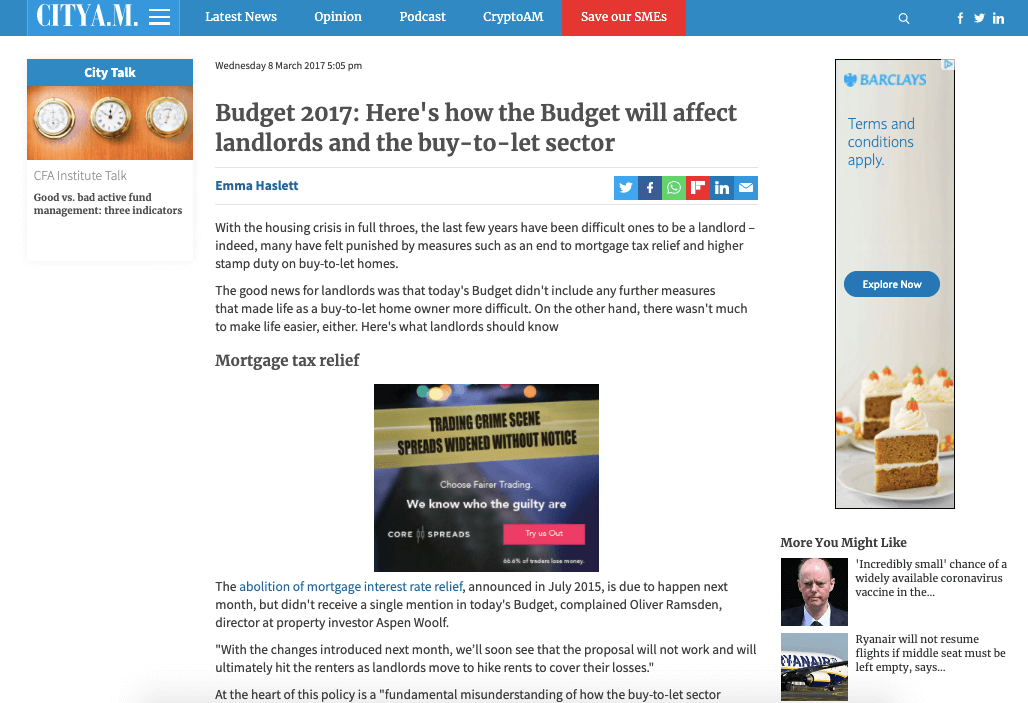Budget 2017: Here’s how the Budget will affect landlords and the buy-to-let sector

With the housing crisis in full throes, the last few years have been difficult ones to be a landlord – indeed, many have felt punished by measures such as an end to mortgage tax relief and higher stamp duty on buy-to-let homes.
The good news for landlords was that today’s Budget didn’t include any further measures that made life as a buy-to-let home owner more difficult. On the other hand, there wasn’t much to make life easier, either. Here’s what landlords should know
Mortgage tax relief
The abolition of mortgage interest rate relief, announced in July 2015, is due to happen next month, but didn’t receive a single mention in today’s Budget, complained Oliver Ramsden, director at property investor Aspen Woolf.
“With the changes introduced next month, we’ll soon see that the proposal will not work and will ultimately hit the renters as landlords move to hike rents to cover their losses.”
At the heart of this policy is a “fundamental misunderstanding of how the buy-to-let sector operates”, added Steve Bolton, founder of Platinum Property Partners.
“It also completely contradicts the importance placed on the rental sector in the government’s recent housing white paper. When this tax was introduced in Ireland, rents soared until the government was forced to repeal its policy.
“The same will undoubtedly happen in the UK. But while we wait for government to realise its mistake, thousands of hardworking tenants and landlords will suffer. The Tenant Tax must be abolished before real damage is done to rental sector.”
Stamp duty
A three per cent hike to stamp duty on buy-to-let properties is another of George Osborne’s legacies, part of his attempt to increase the number of homes available to first-time buyers.
Rosie McCormick Paice, real estate partner at Pemberton Greenish, said the decision not to row back on the rule was “disappointing”.
“The surcharge has slowed down the housing market with revenue from [stamp duty] reducing – revenue that could have been invested in housing schemes that would help ease the housing crisis.
“It is particularly tough on UK investors. Those purchasing in USD or euros receive more for their money due to the weakened value of GBP and therefore find the three per cent surcharge less of a disincentive for investment.
It’s another charge which will be passed on to tenants, she added.
“None of this can be consistent with the government’s pledge to help the ‘just about managing’ families in the UK.”
Digital tax returns: a bit of good news
One of the measures Hammond did announce today was a delay to the deadline after which the self-employed will be forced to submit digital tax returns.
The Residential Landlords Association said the one-year delay will be a good thing for landlords: its research suggests just 48 per cent use spreadsheets for record keeping – 38 per cent use paper records and 13 per cent use specialist software.
“While we support efforts to improve the efficiency of the system, faced with unhelpful changes to the way they will be taxed, the last thing landlords needed was an imminent change to the way they keep their records,” said Douglas Haig, the Association’s vice chairman.
“The chancellor has made the right decision in giving landlords more time to prepare for this important change.”

